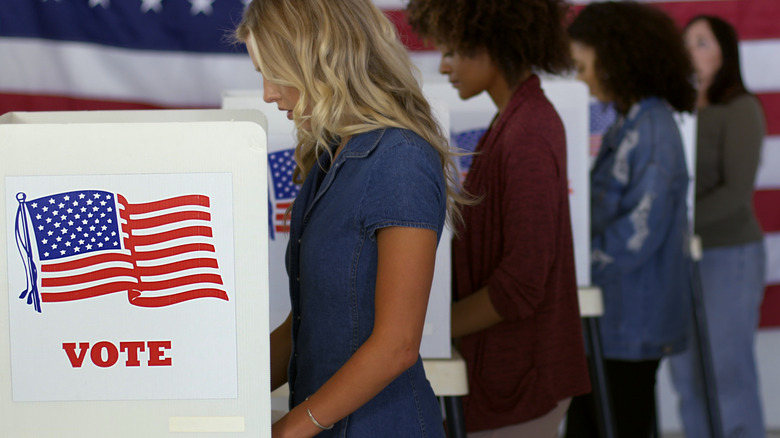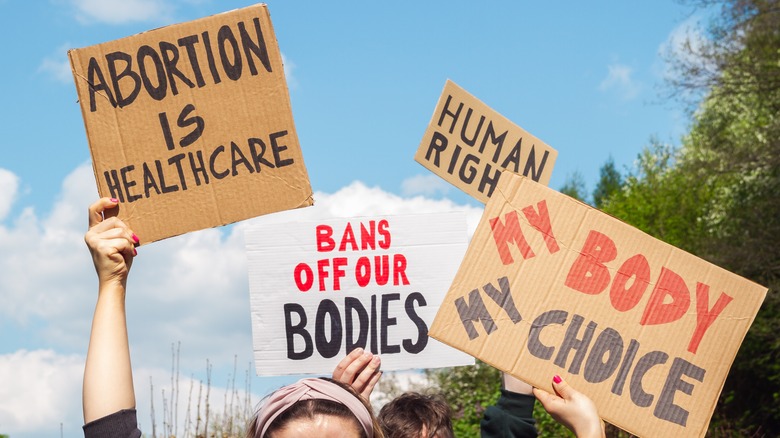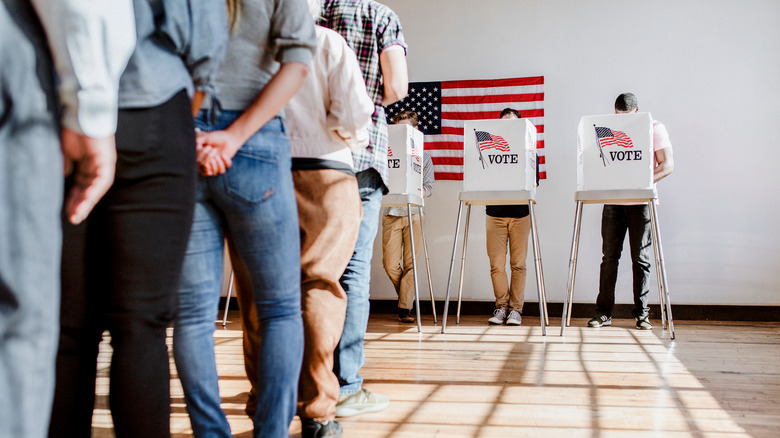Survey Shows Whether Abortion Rights Will Really Drive Women To The Polls In November
Abortion has always been an important issue in elections but in this new post-Roe world, the stakes of election results have never been more tangible. Now that abortion is no longer protected on a federal level, voters have been doing what they can to keep the right to choose.
In June 2022, the Supreme Court handed down a decision in the case of Dobbs v. Jackson Women's Health Organization which overturned the previous protections established in Roe v. Wade. In the immediate aftershock, trigger laws in nine states went into effect, banning abortion except in certain circumstances (per CNN). But as more states work to ban abortion completely, fears about what healthcare will be legally accessible are pushing more people to the polls.
Kansas was the first state to see its voters shut down their elected officials. In August 2022, a constitutional amendment allowing the state to restrict abortion rights was struck down, per The Washington Post. The key to their success, the outlet said, was voter turnout. According to an analysis of data provided by the Kansas Secretary of State, "turnout was unusually high regardless of whether county voters, on balance, favored or opposed the amendment," The Washington Post reported.
Even before Roe v. Wade was overturned, the Pew Research center noted the majority of Americans were in favor of the right to abortion. As the November midterm elections draw nearer, many are wondering if abortion will continue to be the motivating issue that gets people to the polls.
States with abortion on the ballot in the 2022 November midterm elections
The 2022 November midterm elections are some of the most important political races we've seen in a while. CBS News reports that not only is control of the House and Senate up for grabs, but five states are putting the right to an abortion in the hands of voters. According to Ballotpedia, the number of elections with abortion on the ballot is the highest it's been since 1986.
Shwetika Baijal, a spokesperson for Planned Parenthood, told Thrillist that this is why voting in the midterm elections is so important — this year especially: "who wins could determine which states protect access to abortion and whether national politicians have the votes to realize their ultimate goal, a national abortion ban."
Alabama, Louisiana, Tennessee, and West Virginia have already all voted to decline constitutional protection for abortion, which Business Insider points out is why Kansas' choice to protect abortion rights is so poignant.
As The 19th stated, Kentucky will be deciding whether or not the right to abortion was protected by the state's constitution — an amendment extremely similar to the one voters in Kansas struck down in August. If voters choose to protect abortion rights, it paves the way for the Kentucky Supreme Court to overturn Kentucky's current ban on abortion.
Other states that have abortion rights up for grabs are Montana, Vermont, California, and Michigan (per Business Insider).
Expect to see higher numbers at the polls in November
Abortion rights aren't just a big deal for people who want to terminate pregnancies. For fertility clinics in states where abortion may be banned, it could mean the end of their practice.
In some states, the right to abortion may come down to which senator gets elected. Thrillist reports Arizona's race is especially close between Senator Mark Kelly — a co-sponsor of the Women's Health Protection Act — and his opponent, Blake Masters, who is not only endorsed by former president Donald Trump, but believes abortion is "demonic."
With so many far-reaching effects of the Roe v. Wade reversal, it's no surprise research is showing there could be record turnouts at the polls. According to a new survey published by the Kaiser Family Foundation, abortion is going to be this year's motivating topic. The data shows that 44% of women will be voting next month because of the repeal.
The survey also showed that the belief in the right to abortion doesn't fall strictly down party lines, either — a continuation of what Kansas voters proved back in August. More than half of voters oppose total abortion bans, allowing private citizens to "sue people who provide or assist in abortions," or making abortion a crime (via Kaiser Family Foundation).


